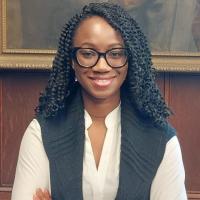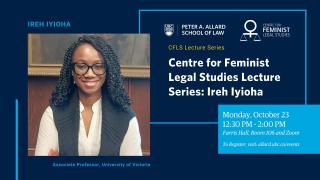This event is postponed.
Description of Event
Women—especially those at the intersection of various axes of inequality—are disproportionately impacted by disasters, such as public health disasters. While the gendered nature of disasters and women’s special vulnerability to disaster impact is well articulated, use of the term “vulnerable” to describe those who—due to various metrics, such as race and class—are particularly susceptible to harm is itself contested, as evident in Fineman’s ‘Vulnerability Theory’ and related interpretations that conceptualize vulnerability in universal terms. As the idea of the universal vulnerable subject promises to transcend the limits of anti-discrimination law and identity politics, this talk asks: What does it mean to be vulnerable and therefore entitled to law’s special protections? And what do the non-neutral impacts of disasters reveal about the structure and limits of the idea of universal vulnerability?
Speaker

Dr. Ireh Iyioha is an Associate Professor of Law at the University of Victoria and Associate of the Department of Philosophy at Harvard University. She has served as a Visiting Scholar at Harvard University and the University of Toronto, and as a Nathanson Fellow at Osgoode Hall Law School. She researches on the limits and effectiveness of law in several areas, including public health and disaster law, and women’s health law. Her recent edited book—Women's Health and the Limits of Law—offers a theory of Substantive Legal Effectiveness (SLE) for assessing the impact of law on society and for which she received the Canadian Association of Law Teachers (CALT) Award given for “a paper that makes a Substantial Contribution to Legal Literature”. Dr. Iyioha’s scholarship and service to the local and global communities have been recognized internationally through numerous awards, including the World Congress on Medical Law Award issued by the World Association for Medical Law, a Top 40 under 40 in Edmonton Award by Avenue Magazine for “writing and teaching law with an unflinching commitment to human rights,” and a Stars of Alberta Award from the Queen’s Representative, the Lieutenant Governor of Alberta for exemplary leadership in service and improving the overall quality of life of Albertans. She is a recipient of a Canadian Bar Association Law for the Future Fund Grant to study inequality, vulnerability, and the limits of pandemic law, and holds a Social Sciences and Humanities Research Council (SSHRC) Grant for a multi-country study of populism and obedience to law in the context of public health restrictions.
- Centre for Feminist Legal Studies
- All Students
- Faculty
- Staff
- Research Talks
